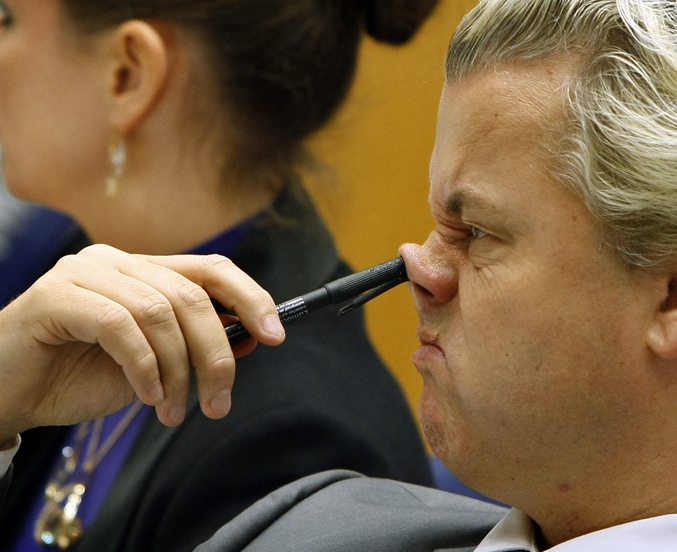
Despotic powers
Mark Rutte deserves credit for being the first Dutch prime minister in decades capable of answering a question with a simple ‘yes’ or ‘no’. That major achievement, however, is where his credit ends. He has taken the lead of a ‘center-right’ minority coalition, in a stranglehold embrace by Geert Wilders’ fear-mongering anti-islamist PVV on which the coalition depends for key support.
The recent cuts in culture funding that this government has introduced, nominally to make the Netherlands more economically competitive, do not stand on their own. Despite introducing ‘animal cops’ to defend the rights of pets, this government has decimated its spending on nature preservation as well (yes, the Netherlands, despite being the size of a stamp, has wild parks). It has given up on green and clean energy, has dramatically reduced developmental aid, and has symbolically increased the speed limit on a tiny stretch of freeway to 130 km/h.
The anti-arts attitude which this government has adopted was carefully incubated by years of Wilders-copyrighted hate speech, which has now become standing policy. The government is going to severely cut cultural funding, mostly in the visual arts. It is going to eliminate entire institutions, and in effect is organizing a single massive layoff from state-supported and state-stimulated jobs in the cultural sector. Secretary of Culture Halbe Zijlstra is proud not to be an arts connoisseur – it would make it more difficult for him to make cuts. He sidelined his advisory board, the Council for Culture, which proposed a gradual implementation of the austerity measures.
After a crucial visit to the Holland Festival, Zijlstra last minute exempted a few top end performing arts organizations from his cutbacks. In fact, these were exactly the type of institutions the well-educated share of the VVD electorate appreciates for its time-tested productions. Zijlstra’s ad hoc ‘generosity’ only further reveals the despotic power behind the austerity measures.
The less fortunate institutions, in response to the cutbacks, now urge the public to sign petitions in their support, one petition per institution. These organizations do exactly what their executioners hoped for; they start to fight for their individual survival instead of helping each other.
It should be said that the cuts come not entirely unexpected. Some of the arts institutions which now suddenly bemoan and lament the degrading of the Dutch government were completely unconcerned by the rise of the political movement which made this possible to begin with. A large share of culture funding beneficiaries simply didn’t consider their own relationship to the larger public context, nitpicking at politically inspired work that was not just for conceptual infotainment. This near-complete, leisure-focused de-politization of the Dutch arts and culture scene has finally been refuted.
We should ask ourselves if it is such a bad idea to get rid of some of the entitlement that we have come to take for granted, as this has made the entire cultural system dependent not as much on public money, as on the personal whims of our corrupted political leaders.
What kind of leaders do we have? They are a laughable bunch of autocrats who, while cutting on culture, are instituting the Netherlands as a society of control.
When the historian Thomas von der Dunk was invited to give the annual Willem Arondeus lecture (named after a homosexual resistance fighter) in April 2011, he wrote a speech which contained critical comments on Wilders and his PVV. The PVV got word of this, and had its political allies cancel the lecture, threatening to kill the entire lecture as an institution. Von der Dunk gave a lecture anyway. This is the cultural warfare that this government is launching on dissent.
Wilders is the sole dictator of his own Stalinist-style political organization, running from the parliament building a shady private enterprise, ‘OnLiberty BV’, of which the finances are undisclosed. Nobody in the Netherlands cares the less. This is only a small exponent of a corrupted political order, cynically underpinned by a culture of sheepish civic cooperation with authorities. The war on art, war on ideas, and war on dissent that this government has unleashed will become a cultural divide, and it will take more than the signing of a petition to come to terms with it.
Finally this will allow people abroad to see the Netherlands for what it really has become: a small-minded security haven for rich, white pensioners. No longer the liberal laboratory of Europe, we need a new resistance, a new politics, and a new art to set us free. No one will do it for us. We will have to create it ourselves.
Metahaven
Amsterdam, June 20, 2011
Metahaven


















